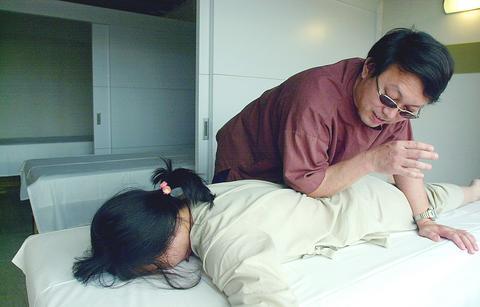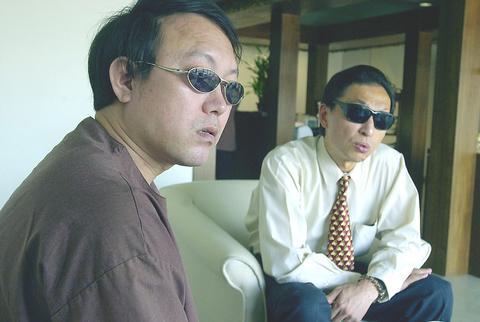Ever since Minister of the Interior Yu Cheng-hsien (余政憲) admitted that he had received massages from two unlicensed sighted masseuses, the welfare of blind masseurs has become a topical issue.
In the past blind masseurs have been associated with dark and shabby rooms with rudimentary equipment, usually little more than a simple bed.
But now, when one walks into the Blind Massage Health Center (

PHOTO: CHIANG YING-YING, TAIPEI TIMES
The center is run by the Cultural and Educational Foundation for the Blind (
A fashionable aroma permeates the air inside the center, and the relaxing light-brown color scheme is designed with a Zen minimalism calculated to attract the young urban crowd.
Three cloud-like, puffy couches in the reception area encourage visitors to relax and enjoy a good massage.

PHOTO: CHIANG YING-YING, TAIPEI TIMES
Besides traditional massages, the center also offers an oil massage, a trendy stress-relieving treat that is very popular among city-dwellers.
"When we opened our first center it did not do that well, because we mainly arranged the shop with the masseurs' convenience in mind, not that of the customers. When we realized that this caused a problem, we decided to prioritize the comfort of customers. We opened this flagship center in April, hoping to compete with the sighted masseurs for business," said Steven Chang (
"Although sighted masseurs sometimes offer better facilities, their massage skills cannot compete with ours because the blind masseurs receive long-term training, usually for two years.
"We also provide customers with a complete manual massage, while the massage services in spas and beauty salons usually make use of machines."
Chang said that, unlike the traditional blind massage shops, the center does not offer home services.
"We have this beautiful center, and of course we want people to come and enjoy the nice setting and atmosphere," he said.
The center's smart appearance and the quality service seem to be getting results. Around 700 to 800 massages are performed every month, with customers spending between NT$700 and NT$1,400 for the service.
Chang said it was already difficult for the visually impaired to survive in the competitive job market, and if the government opened up the industry to sighted masseurs, the visually impaired would face a bleak future.
Article 37 of the Disabled Protection Law (
Sighted people started campaigning for the right to work as masseurs after the scandal involving Yu.
Although Democratic Progressive Party (DPP) legislators expressed support for sighted masseurs, they dared not talk about amending the law.
One of the center's masseurs, 45-year-old Chen Lien-tsai (
"We even depend on others to get out of the door -- how can we protest for our rights?" Chen said.
Some lawyers and scholars have argued that reserving the massage industry for the visually impaired violates Article 15 of the Constitution, which protects the rights of all citizens to work.
Chen Chieh-ju (
"The special law [the Disabled Protection Law] should have priority over the Constitution to protect the rights of disadvantaged people," Chen said.
She said Taiwan has been ignoring the rights of disabled people for a long time, and that there was no other choice except using strict laws to protect their rights.
"I am not completely opposed to opening up the industry, but there has to be very strict and clear regulations on what the sighted masseurs can do, and the law has to be enforced completely to protect the blind masseurs' rights," Chen said.
Besides the Blind Massage Health Center, blind masseurs have set up service points at Taipei municipal hospitals, Taipei Railway Station and the offices of the Taipei City Government. This was achieved with help from the government, to improve the public's access to their services.
At these service points there are usually only a few chairs for the customers, but business is looking good, because customers usually have to queue.
With the help of good marketing concepts, visually impaired masseurs are no longer confined to little shops and can now expand their business.
The Taipei City Council yesterday opened a massage station staffed by blind people, and invited Yu to attend the opening ceremony.
Yu did not show up, but he did send a top-level official to say that the ministry is determined to protect the work rights of visually impaired people.
"We will not open up the massage industry to sighted people while blind people are still not guaranteed comprehensive employment opportunities in society," said Ju-na Chiu (
"Currently there are only a little more than 2,400 licensed masseurs, but there is a great demand for massage services in the community, so we will work on improving the professional training for blind people.
"At the same time, we also understand that this is not the only profession blind people can enter. According to our survey, there are now 64 professions with blind employees, but 70 percent to 80 percent of blind people are engaged in the massage business. We will also develop different jobs that are suitable for blind people," Chiu said.
According to figures provided by the Ministry of the Interior, there are about 45,000 blind people in Taiwan, of which 16,000 are old enough to work.
About 6,000 out of them are working, and just more than 2,400 are licensed masseurs.
The Blind Massage Health Center's address is: 5F, 146, Minchuan E Rd. (
Call (02) 2509-3363 for an appointment.

Chinese Nationalist Party (KMT) Chairman Eric Chu (朱立倫), spokeswoman Yang Chih-yu (楊智伃) and Legislator Hsieh Lung-chieh (謝龍介) would be summoned by police for questioning for leading an illegal assembly on Thursday evening last week, Minister of the Interior Liu Shyh-fang (劉世芳) said today. The three KMT officials led an assembly outside the Taipei City Prosecutors’ Office, a restricted area where public assembly is not allowed, protesting the questioning of several KMT staff and searches of KMT headquarters and offices in a recall petition forgery case. Chu, Yang and Hsieh are all suspected of contravening the Assembly and Parade Act (集會遊行法) by holding

Taiwan would welcome the return of Honduras as a diplomatic ally if its next president decides to make such a move, Minister of Foreign Affairs Lin Chia-lung (林佳龍) said yesterday. “Of course, we would welcome Honduras if they want to restore diplomatic ties with Taiwan after their elections,” Lin said at a meeting of the legislature’s Foreign Affairs and National Defense Committee, when asked to comment on statements made by two of the three Honduran presidential candidates during the presidential campaign in the Central American country. Taiwan is paying close attention to the region as a whole in the wake of a

PRAISE: Japanese visitor Takashi Kubota said the Taiwanese temple architecture images showcased in the AI Art Gallery were the most impressive displays he saw Taiwan does not have an official pavilion at the World Expo in Osaka, Japan, because of its diplomatic predicament, but the government-backed Tech World pavilion is drawing interest with its unique recreations of works by Taiwanese artists. The pavilion features an artificial intelligence (AI)-based art gallery showcasing works of famous Taiwanese artists from the Japanese colonial period using innovative technologies. Among its main simulated displays are Eastern gouache paintings by Chen Chin (陳進), Lin Yu-shan (林玉山) and Kuo Hsueh-hu (郭雪湖), who were the three young Taiwanese painters selected for the East Asian Painting exhibition in 1927. Gouache is a water-based

President William Lai (賴清德) has appointed former vice president Chen Chien-jen (陳建仁) to attend the late Pope Francis’ funeral at the Vatican City on Saturday on his behalf, the Ministry of Foreign Affairs said today. The Holy See announced Francis’ funeral would take place on Saturday at 10am in St Peter’s Square. The ministry expressed condolences over Francis’ passing and said that Chen would represent Taiwan at the funeral and offer condolences in person. Taiwan and the Vatican have a long-standing and close diplomatic relationship, the ministry said. Both sides agreed to have Chen represent Taiwan at the funeral, given his Catholic identity and